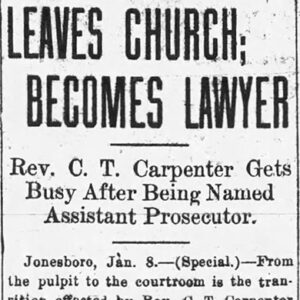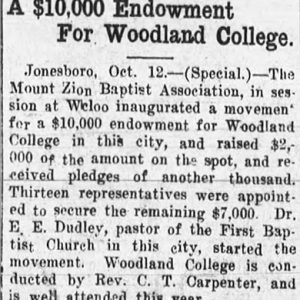calsfoundation@cals.org
Cornelius Tyree Carpenter (1874–1945)
Cornelius Tyree (C. T.) Carpenter was an educator, minister, and attorney in northeastern Arkansas. In addition to serving as president of Woodland Baptist College in Jonesboro (Craighead County) and being minister of the First Baptist Church of Marked Tree (Poinsett County), he gained national attention as the attorney for the Southern Tenant Farmers’ Union (STFU) from 1935 to 1936.
C. T. Carpenter was born on September 5, 1874, in Rockbridge County, Virginia, to John T. Carpenter and Sarah Carpenter. He had three brothers and one sister. His father was a Baptist minister who studied under General Robert E. Lee at Washington College after the Civil War. The family was well established in Virginia and, according to Oren Stephens of Harper’s Magazine, was regarded as one of the few Southern aristocratic families. Carpenter attended the Williamsburg Institute in Kentucky (now the University of the Cumberlands) to become a teacher, though his date of graduation is unknown.
Carpenter moved to Jonesboro in 1901 to teach at Woodland Baptist College, the first Baptist college in Jonesboro. Carpenter was Woodland’s president from 1904 to 1910. This position made him very popular in Jonesboro. The editor of the Jonesboro Times-Enterprise stated that there has “never been a citizen who stood in higher public favor and was respected more than Prof. Carpenter.”
He married Floy Virginia Knight in Jonesboro on June 28, 1905. They had three children.
In 1910, Carpenter became an ordained Baptist minister and relocated his family to Marked Tree to serve as leader of the First Baptist Church. Almost two years later, he left that position to spend more time in his budding law practice. In December 1911, he was appointed deputy prosecuting attorney for Poinsett County. While serving under Prosecuting Attorney Thaddeus H. Caraway, Carpenter focused on the temperance efforts in rural areas. The appointment as deputy prosecuting attorney was short lived, as Carpenter resigned his position in the summer of 1912.
Over the next two decades, Carpenter represented Poinsett County’s largest landowner, Ernest Ritter, and other planters in numerous cases. For this reason, many were surprised when, in 1935, he became the first attorney for the Southern Tenant Farmers’ Union, formed in Tyronza (Poinsett County). This interracial sharecropper union garnered national attention in their fight against the planter class. Carpenter represented the STFU in cases involving whitecapping (a.k.a. nightriding) and advised the union on the best legal courses of action against unfair labor practices. In February 1935, Carpenter successfully defended four union members against allegations of improper solicitation related to the collection of STFU dues.
Nightriders quickly targeted two of the acquitted members, W. H. Schultz and A. B. Brookins. Carpenter also fell victim to these extra-legal attempts to silence the interracial union. On March 27, 1935, eight to ten carloads of white men surrounded Carpenter’s home in an effort to intimidate him for his role in the union. The mob ordered him to come outside, and when he refused they fired two rounds into his house. One shattered the porch light. This account was published in newspapers from Blytheville (Mississippi County) to New York City as an illustration of the ongoing conflict between union supporters and opponents. The day after the attack on his home, Carpenter advised union members to avoid public meetings in an effort to avoid a further escalation of violence.
Despite his controversial role in the union, Carpenter made clear he was a committed Democrat and supporter of President Franklin D. Roosevelt. His commitment to the Democratic Party secured him a position on the newly formed Arkansas Tenancy Commission. He left his position in the union to fulfill this commitment. Carpenter was a vocal member of the commission, proposing the formation of cooperative farms for sharecroppers and tenants on small contiguous farms. He also proposed an increase in state-funded educational programs in the rural areas where tenancy and sharecropping were most prevalent.
In 1941, Carpenter became a charter member of the Arkansas Historical Association and served as the association’s director for the First Congressional District.
Carpenter died in an automobile accident on September 14, 1945, in St. Francis County. The African-American newspaper Chicago Defender published his obituary and stated he was “known for his fight for the underdog.”
For additional information:
“Night Riders Visit Tenants’ Lawyer.” Blytheville Courier News, March 27, 1935, p. 1.
“C. T. Carpenter Dies in Auto Crash.” Chicago Defender, October 13, 1945, p. 11.
“Cooperative Farms Suggested to Arkansas Commission.” Jackson Sun, October 16, 1936, p. 7.
Daniels, Jonathan. A Southerner Discovers the South. New York: Macmillan, 1938.
“Prof. C. T. Carpenter Ordained a Minister.” Jonesboro Daily Tribune, June 7, 1910, p. 3.
Ritterhouse, Jennifer. Discovering the South: One Man’s Travels Through a Changing America in the 1930s. Chapel Hill: University of North Carolina Press, 2017.
Stephens, Oren. “Revolt on the Delta: What Happened to the Sharecroppers’ Union.” Harper’s Magazine, June 1, 1941.
“Two Killed Instantly in Auto Collision.” Arkansas Gazette, September 15, 1945, p. 2.
Heather McNamee
University of Memphis
 Civil Rights and Social Change
Civil Rights and Social Change Early Twentieth Century, 1901 through 1940
Early Twentieth Century, 1901 through 1940 Education, Higher
Education, Higher Religion
Religion Cornelius Tyree Carpenter Article
Cornelius Tyree Carpenter Article  Woodland College Article
Woodland College Article 




He was my great-grandfather. He died on my mom’s 9th birthday. I have his wedding apparel and my great-grandmother’s also.